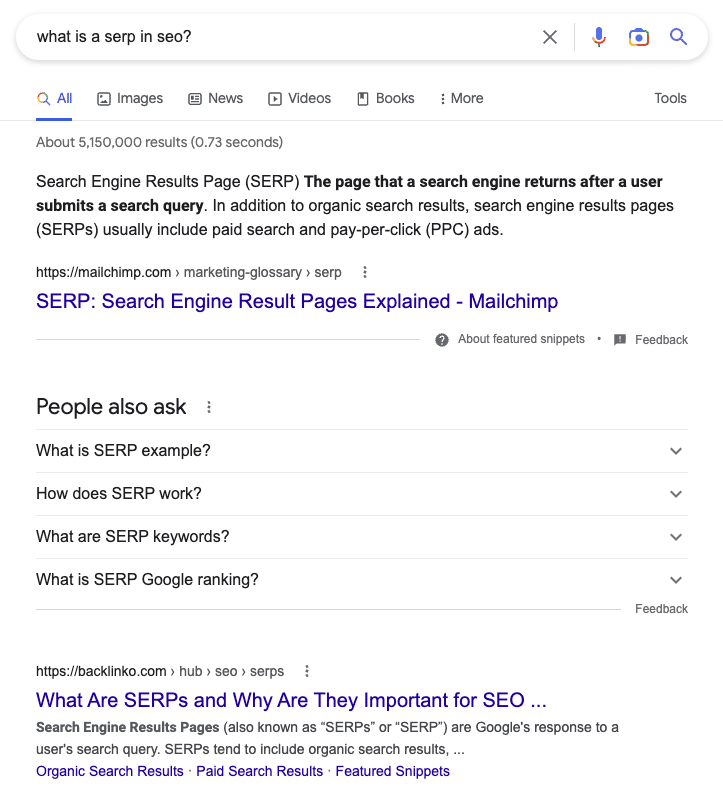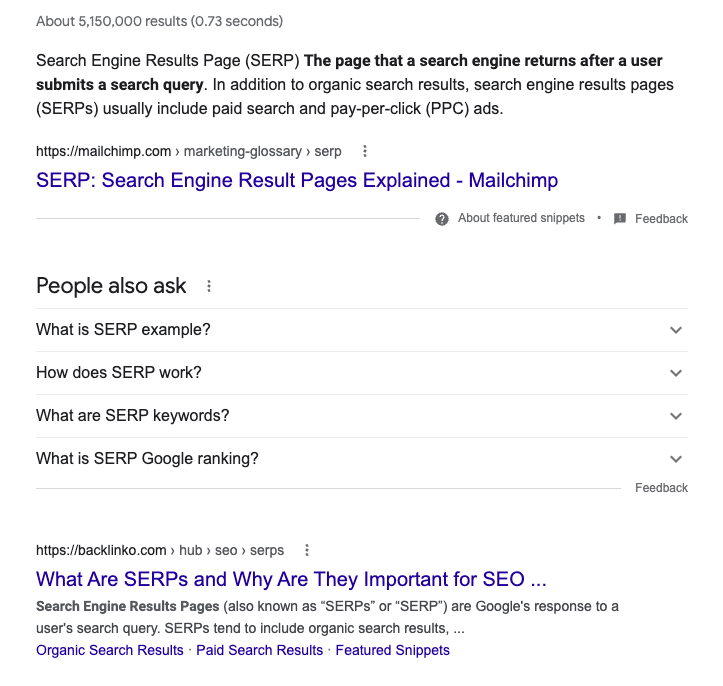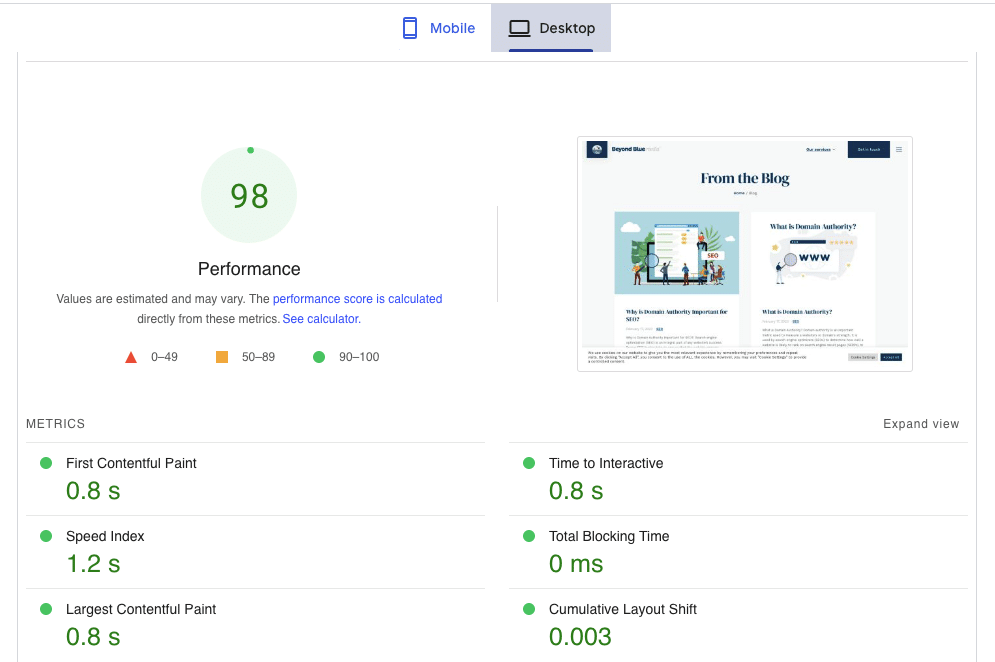

What is a SERP in SEO?
Search engine result pages (SERP) are the web pages presented to users after entering a search query into a search engine like Google or Bing. SERPs typically contain two types of content: organic and sponsored.
Organic content is naturally included in the search engine's index (think blog posts and service pages), and sponsored content refers to content that's been paid-for and is placed at the top of the search engine's results page (think advertisements). Search engines use SERPs to rank websites in order of relevance to the user's query.
Search engines use different algorithms and methods to determine which websites are most relevant to the user, making the results seen on Google different than those on DuckDuckGo. By optimizing website content for search engine algorithms, businesses and hobbyists can improve the odds that their websites are presented at the top of SERPs and increase their chances of being seen by potential customers.

What is a SERP Body?
The SERP body is the main area of the search engine results page that provides the organic search results for a query. It is the area below the search bar of SERP page. It typically contains search results with titles, URLs, and short descriptions of the web pages being displayed. The SERP body is an integral part of SEO, as it determines which pages are displayed and ranked higher in the results.
If your website is optimized for SEO, your optimizations should appear in the SERP body and hopefully rank higher than your competitors (but as we know, SEO rankings are never a sure thing). Popular SERP body optimizations can be performed using syntactically correct schema, meta tags, and common sense, oftentimes helping Google and its users more accurately determine the purpose of a webpage.
How do SERPs work?
Search engines first crawl the web to find web pages most relevant to the user’s query. It then uses algorithms to rank the pages and display the most relevant web pages at the top of the SERP. The SERP can also include other content, such as images, videos, news, and local listings. This content is determined by the search engine based on the query and the relevance of the content to the user’s search.
Once the SERP is generated, the user can click on the results to be directed to the webpage they are interested in. The SERP also usually contains sponsored results, which are websites paying the search engine to be featured at the top of the page.

What are the different types of SERPs?
There are several different types of SERPS. Depending on a user's search query, they are typically composed of web pages, images, news, videos, products, maps, books, and more. Web pages, images, books, news, and videos are derived from strong technical and practical SEO efforts, including optimizing web pages with relevant keywords, backlinks, and other tactics to improve the site’s organic search rankings.
Images and videos are optimized similarly by using relevant keywords and tags to ensure they appear in the SERP. On the other hand, products and maps are derived from SEO efforts such as optimizing product listings and local SEO. For example, local SEO focuses on optimizing a website for local searches and optimizing directory listings like Google Business Profiles to ensure they appear in Google Maps.
What are the benefits of SERPs?
SERPs provide users with a list of relevant web pages, images, and other content related to their query. The benefits of SERPs are immense, and they have become an integral part of the online experience. Firstly, SERPs provide users an easy way to find what they want. They are organized in a way that makes it easy for users to quickly scan through the results and decide which page to visit.
Additionally, SERPs offer helpful information about the pages through snippets and reviews, which can help users make more informed decisions about which page to visit. Furthermore, SERPs also display ads, which can help direct users to other relevant websites or products (ads also help business owners who can't yet outrank their competitors organically). Put simply, SERPs are an invaluable tool for both users and website owners.

What factors affect SERP rankings?
The factors affecting SERP rankings include content relevancy, keyword usage, website structure, page loading speed, backlinks, and hundreds of other factors that are easy to overlook. Search engines use algorithms to rank search results based on these factors. The relevancy of content is the most important factor in SERP rankings. Content relevant to the searched topic will rank higher in the search engine results pages (SERPs).
Additionally, using the right keywords and topics in content is essential for ranking higher. Search engines use keywords to help determine the relevancy of content to the searcher's query. Website structure is also an important factor for SERP rankings. Search engines will analyze website structure to determine the relevancy of domain itslef to the search query, usually measured by domain authority. This includes analyzing the page titles, meta tags, headings, and other website elements.
Page loading speed is also a factor in SERP rankings. Search engines prioritize faster-loading pages over slower-loading pages because most users will abort a page load that takes longer than three seconds. Backlinks are also crucial for SEO in terms of SERP rankings, as they strongly influence a website's domain authority.
How will SERPs change with the introduction of AI chatbots?
The introduction of AI chatbots will have a massive impact on SERPs. As chatbots become more sophisticated and able to comprehend natural language, they can provide more detailed and accurate search results. This will result in more relevant content being presented to the user, which will more likely lead to a successful search.
In addition, AI chatbots will be able to provide more interactive experiences to users, allowing them to ask questions and receive tailored answers based on their specific queries. This will create an engaging, conversational experience with the search engine, further enhanced by the AI chatbot’s ability to understand the context and provide more personalized results. This could lead to an overall improved user experience, resulting in more satisfied users and more successful searches.
The Bottom Line
SERPs play a crucial role in search engine engagement because they are the piece that connects the searcher with the content they are searching for. Google was the frontrunner for search engine innovation until Bing recently decided to adopt ChatGPT to help people find more relevant results. But I'm sure in time Google will release something to compete.
While it is no surprise to us SEOs that the SERPs are living, breathing creatures, it should be noted that the basic function of a SERP has remained constant since the dawn of SEO: to help people find what they're looking for. And although AI bots appear to be taking over the world, the fundamental purpose of search engines will never change.
Contact us today to learn more about how we can revolutionize your marketing efforts like never before!


